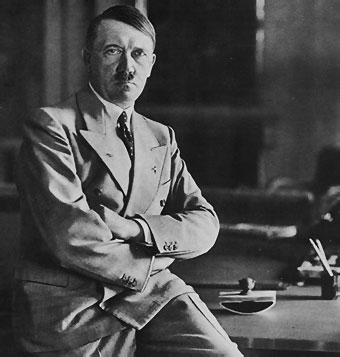
The Treaty of Versailles was ratified in 1919 and Germany had to pay a lot of reparations for all the damages caused by the war. Germany also lost her colonies and a big part of her territory. This treaty was humiliating, degrading and harsh for Germans; many shared the sentiment of seeing Germany as a great nation, just like Hitler did.
After a war in Munich, Hitler was assigned to keep an eye on the German Worker’s Party, which was disorganized and had no plan; however, Hitler saw this party as a way of accomplishing his political ideas. His hate for the Jews became part of the party, so the ads for it came out in the anti-Semitic newspapers. The turning point of Hitler’s career happened in a meeting in October 16, 1919 for the reason that his moving speech enthralled the listeners and then donations were made for the party.
With the help of his party staff, Hitler created a party that had 25 points and continued to win support by exciting people’s emotions and his good ideas. Among the 25 points there were negative comments about the Versailles Treaty, annulling civil rights for the Jews and expelling the one that had arrived to Germany.
Some of the things that attracted the most the people were his promotion of the popular wellbeing, the right of establishment of autonomy for Germans and equal rights for their state, etc.
The Bavarian government confronted the Weimar Republic, accusing it of being too left-winged and Hitler supported this event. On November 8, 1923, Hitler proclaimed in the Beer Hall Putsch a revolution and the next day he tried to take over the Bavarian government with an army together with General Ludendorff. Once they had seized power in Munich, they planned to use the place as an operating center against the republic government, but the police suppressed this revolt and accused them for treason. Ludendorff was exonerated for his services to Germany, but Hitler was convicted for 5 years, but only remained in jail for 8 months, time he used to write a part of his book “Mein Kampf”, which was an autobiographical book that narrated some of his views on the future of Germans.
The Bavarian government confronted the Weimar Republic, accusing it of being too left-winged and Hitler supported this event. On November 8, 1923, Hitler proclaimed in the Beer Hall Putsch a revolution and the next day he tried to take over the Bavarian government with an army together with General Ludendorff. Once they had seized power in Munich, they planned to use the place as an operating center against the republic government, but the police suppressed this revolt and accused them for treason. Ludendorff was exonerated for his services to Germany, but Hitler was convicted for 5 years, but only remained in jail for 8 months, time he used to write a part of his book “Mein Kampf”, which was an autobiographical book that narrated some of his views on the future of Germans.
After serving his time in prison he decided to get the power constitutionally, using his speech skills (convincing, touching) to make people resist the oppression from the Jews and Communists. He organized again the party under the Führer principle.
After failing his attempts to win the elections, in 1933 Hitler decided to enter a coalition government as chancellor. When Hindenburg (president) died, Hitler succeeded him, and as the economy progressed and he shut down other parties’ hostilities, he claimed himself the dictator of Germany.
He readied for a war, calling for the "Führer Conference," when he showed his plans for a war of aggression in Europe. The ones who did not support him were sent away and got support from the lower middle class and peasantry, most of them, Protestants.
But, why did people support Hitler?
People supported Hitler because he promised them what they wanted and needed to hear.

Taken from: http://www.schoolhistory.co.uk/lessons/riseofhitler/whysupport.htm
And to everyone he swore he would bring back honor by ending with the treaty of Versailles and making Germany great.
Taken from: http://www.schoolhistory.co.uk/lessons/riseofhitler/whysupport.htm
And to everyone he swore he would bring back honor by ending with the treaty of Versailles and making Germany great.
No hay comentarios:
Publicar un comentario